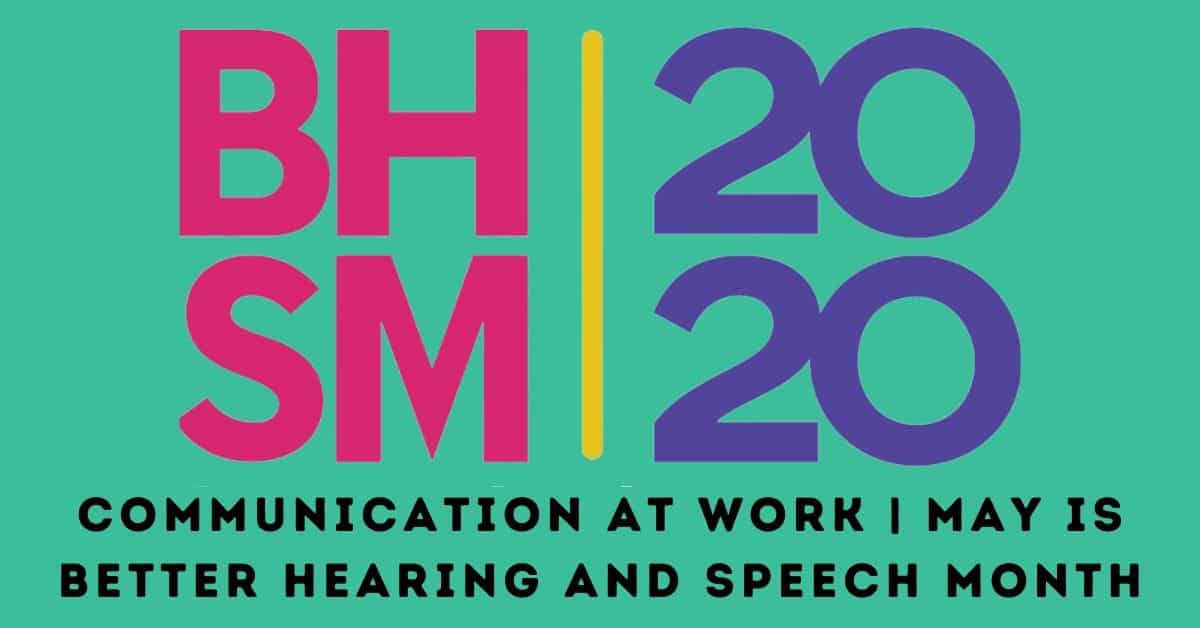
This May, let’s celebrate Better Hearing and Speech Month together! Each year we set aside this month to consider a new dynamic of the importance of hearing health. For 2020, the American Speech-Language-Hearing Association has designated the theme of “Communication at Work.”
In order to properly give attention to the issue, let’s rewind to the last time you were in the workplace and had a communication issue. By unpacking each dimension of this communication challenge, we may be able to understand how hearing was vital at each step along the way. On the contrary, gaps in hearing ability might have contributed to miscommunication, making it difficult to remain productive and efficient in the workplace.
Communication Challenges at Work
When you had a communication challenge at work, what started the problem? Some of these difficulties originate due to a mistake by the communicator. In other words, the person who had a message to get across might have framed, packaged, or categorized the information in a way that was difficult to decipher. Consider a person who chose to have a conversation at a busy and sociable lunch event. In this case the setting might have impeded the communication process, a location where voices were too loud and the social setting was distracting.
Choosing to communicate important information in an unclear manner can be the origin of miscommunication. In the second case, some communication challenges arise on the receiving side. A person who works in a distracted manner might struggle to get important messages, no matter how clearly they are delivered. For instance, a person who tends to work with headphones on might be distracted from important information that is communicated verbally. In these cases, solutions to communication problems can arise from the person tasked with listening.
Finally, some communication challenges in the workplace can arise due to the medium of communication. While some messages are appropriate for a lengthy email, others are suited to a simple note in inter-office chat. Other messages are better delivered through a phone call, while still others make the most sense in a face-to-face conversation.
In any of these modes of communication, the medium can also pose a challenge. Take, for example, the inter-office chat medium. This mode of delivery is designed to quickly disseminate quick pieces of information. If a person delivered essential information through a lengthy message in a chat, then it would be possible for a person to miss important information buried within a long message or even to miss the message entirely. For these reasons, many find that essential information is best communicated verbally.
Hearing Loss and Communication Challenges
As you can see, communication challenges can arise in countless ways, and they can originate from the sender of information, the receiver of the message, or even the medium of communication. Though each individual has a preference for the mode of communication in a given setting and for a given type of message, many find that documented verbal communication is an efficient way to get information across without an obstacle arising on the sending side, receiving side, or within the medium itself.
However, verbal communication in the form of a face-to-face conversation or phone call also relies on the hearing ability of both people in that conversation. Those who carry on a conversation rely on the quick back-and-forth of ideas to make sure not only that key information is passed along but also to get confirmation that a person has understood and received the message.
Too many times, undetected or untreated hearing loss gets in the way of efficient verbal communication in the workplace. If you find that you have faced a communication challenge in the workplace due to missed or mixed up information, hearing loss may indeed be the underlying issue preventing a naturally flowing conversation.
Those who suspect hearing loss simply need to have a hearing test to determine if they have undetected limitations. From the point of the hearing test, your licensed hearing healthcare provider can diagnose your needs as well as prescribe the right kind of hearing assistance to get you working at your full level of productivity in the workplace once again.
